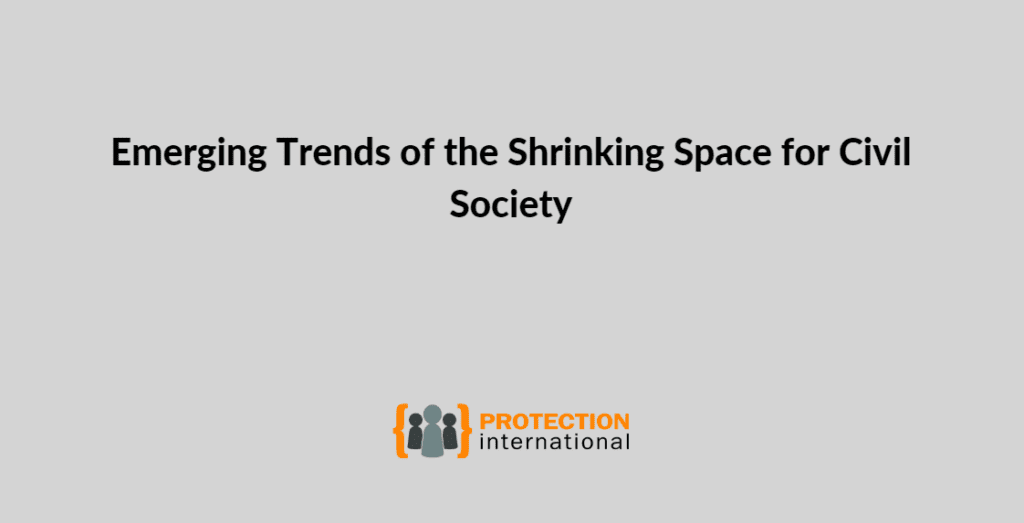Presentation Made by Mauricio Angel
As judicial harassment and criminalization is a matter of high concern for human rights defenders, Protection International (PI) has decided to share this presentation made by Mauricio Angel, PI’s Policy and Research Officer. The speech was delivered at a meeting organized by the European External Action Service (EEAS) with the EU mission focal points on human rights (Brussels, Belgium, 28 February 2013).
The criminalization of defenders can be extremely difficult to counteract, especially for the international community, as it can be easily accused of undue interference in the internal (judicial) affairs of a third country. So, the question for you, as foreign diplomats and officials, is: how could you better prepare yourselves to overcome this challenge?
One first element in your toolbox is to understand the nature of criminalization:
Criminalization is both a strategy and a process to silence defenders. Also very important: it is favored by an environment where the judicial system is weak, allowing for criminal proceedings to become tools of harassment against defenders as well as obstacles to due process.
As a strategy, criminalization is used by state agents and powerful interest groups for stigmatizing and misusing existing legislation against those defenders contesting the status quo, instead of developing sensible public policy responses to social problems.
As a process, criminalization can be seen as a sequence of – often – interdependent steps that are adopted until the goal of neutralizing a defender, or a group of defenders, is reached.
It can start with smear and stigmatization campaigns: examples of this can be found in Colombia, Guatemala, Honduras, and Burundi, where statements of senior public officials portray defenders as “sponsors of terrorism”, “drug traffickers” and “troublemakers”. In the cases of defenders defending social, economic, and cultural rights, they are portrayed as “obstacles to the economic development and progress of the country”.
Senior public officials in Colombia (including the president) made public statements, which portrayed defenders as “sponsors of terrorism” or “corrupt opportunists” (in the case of lawyers working with victims of the conflict). Many defenders were targeted by illegal surveillance activities and wiretapping by the now-disbanded presidential intelligence agency.
In Guatemala and Honduras, senior public officials, including the military and police, qualified community leaders who fear the damaging effects of large economic investments and infrastructure projects as “drug traffickers”, “troublemakers” or even becoming “obstacles to the economic development and progress of the country”.
In Burundi, some journalists have been accused of being “supporters of rebel groups”, while pro-government media has portrayed critical defenders as being individuals willing to overthrow legitimate institutions and destroy the country.
The process then moves on to illegal surveillance (offline and online).
Then to spurious judicial accusations, arbitrary arrests, and imprisonment: examples of this can be found in the case of the Cerezo brothers in Mexico, David Ravelo in Colombia, community leaders in Ecuador, indigenous leaders in Guatemala, and Indonesian environmental and land rights activists.
In Mexico, the Cerezo brothers (founders of Comité Cerezo, ACUDDEH, and collaborators of PD-Mex), have been exonerated of all spurious charges of terrorism but continue to be harassed (see Alejandro Cerezo’s denunciation of being banned to travel abroad).
In Colombia, David Ravelo (CREDHOS and MOVICE), a defender critical of the negotiation with the paramilitaries, was accused and condemned to prison based on unreliable testimonies and refusal of key evidence.
There are several cases of arbitrarily arrested and inculpated Ecuadorian and Guatemalan indigenous community leaders, and Indonesian environmental and land rights activists who campaign for economic, cultural and social.
And criminalization goes beyond, the adoption of new stringent laws, the abusive use of existing laws and legal instruments, and the misuse of administrative regulations and instruments to constrain the exercise of the protection of human rights.
In Guatemala and Ecuador, authorities fail to comply with the consultation process with communities according to the International Labour Organisation (ILO) Convention 169. Legislative decrees amending the Penal Code are used to criminalize and repress peaceful social protests in Peru. The disproportionate use of state security forces, passing and enforcement of laws against defenders, characterize the phenomenon of criminalization in Honduras (i.e. Bajo Aguán region).
In Turkey, the Anti-Terrorism Act was conceived to be a legal instrument to counter the terrorist actions of the PKK. Nonetheless, it is being used to target the Turks of Kurdish origin, and the extreme left Turkish citizens who express any sympathy for the Kurdish cause. The case of Mr. Somyot Prueksakasemsuk, a magazine editor and labour rights activist from Thailand, is emblematic. Somyot was detained in April 2011 and a criminal court found him guilty under the so-called lèse majesté law for allegedly publishing two articles defaming the royal family in January 2013.
In Uganda and Russia, domestic laws that prohibit same-sex sexual activity or the promotion of homosexuality are being used to harass and arrest LGBTI defenders.
In Ethiopia, the government uses repressive legislation, including its 2009 Anti-Terrorism law, to convict, intimidate, and silence dissenting voices. Whereas several of the oldest and most respected Ethiopian human rights groups have been forced to cease most of their operations due to the restrictions on foreign funding imposed by the “Charities and Societies Proclamation” of 2009.You can also identify similar trends in countries such as Russia and Egypt, where local NGOs face staggering restrictions to engage with international entities.
In sum, the negative impacts of criminalization are felt well beyond the falsely accused individual defender:
- Stigmatized defenders become more exposed to physical aggression.
- The process of criminalization has a profound impact on the psychological well-being not only of the defender but also of her/his family.
- Moreover, it weakens civil society organizations and the human rights movement as a whole. Criminalized defenders and their organizations risk losing key support from society and the international community — and of current and potential funders.
- Finally, criminalization strategies that succeed in silencing defenders, end up hampering the healthy democratic debate, thus contributing to the breakdown of the rule of law.


